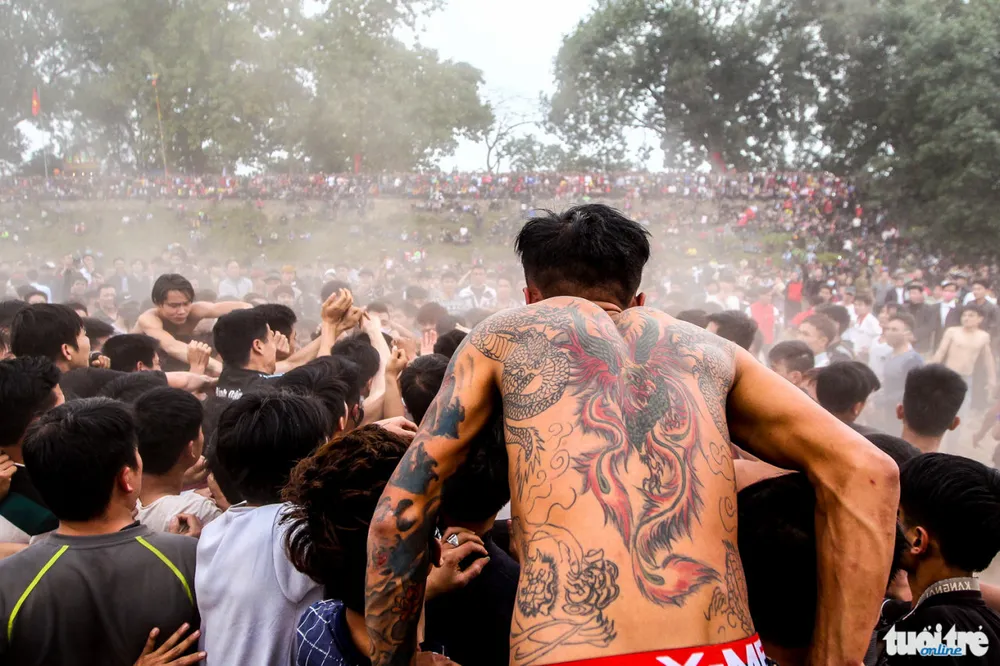
Vibrant and colorful festivities that are usually held during the Tet Lunar New Year were cancelled, and the joy of celebrating this very important annual event with family and friends was completely diminished this year.
Although any epidemic calls for urgent and dire medical emergency measures to be put into place with immediate effect, this present situation could also be an introspection for calling a halt or a considerable reduction of the multitude of festivals that take place across the country all year round. Almost 8,000 festivals are said to take place across the country, which are not just a waste of time and money, but logistically a burden in handling crowds and with it others problems such as hygiene and environmental issues.
An average 21 festivals per day
Without including the celebrations at socio-political events, Vietnam can count an endless array of festival celebrations throughout most of the year. The culture agency is unable to give an accurate figure. In the three parts of the country, north, central and south, about 8,000 festivals, both big and small, can be estimated to take place all year round, which makes for an average of twenty-one festivals a day.
Vietnam’s population of around one hundred million people is subjected to spending days and nights running east to west just participating in these multitude of festive activities. Although festivals symbolize an ancient culture of a country, their relevance in this time and age is questionable. However, notwithstanding any reason for holding so many festive functions, even more festivals are being introduced at the express request of particular groups and communities.
Generally, there are five types of festivals. The first kind includes folk activities; the second are historical and revolutionary festivals; the third represent religious celebrations; the fourth originate from other countries, like Valentine’s Day or Halloween; and the fifth is meant for cultural, sports and tourism events. Of the five above kinds, the fifth type of festival has been seen to be on the increase, leading to excessive waste of time and money, and mainly for the benefit of the nouveau rich or people with new disposable income.
As far as ethnic taste and culture is concerned, festivals are a chance for people to recall their origin and ignite the quintessential spirit of their community. Except for the death anniversary celebrations of the Hung Kings, which has now become a national celebration, other festivals like Huong Pagoda Festival, Yen Tu Festival and Chua Xu Goddess Festival have gone beyond provincial scope. These draw huge crowds of visitors from across provinces, causing concerns about security and environmental destruction.
Mercenary approach to rituals
Over the years, many of these folk festivals have been adapted or reinvented, and gone far beyond their rituals of origin. A mercenary approach to ritualistic celebrations has led to exploitation where visitors are asked for money offerings and so many historical relics and temples look like places seeking materialistic wealth rather than offering visitors some spiritual solace.
Religious celebrations now seemingly include fortune telling and occult rituals such as black magic. These have become hard to question these days, with more and more temples being built, and hundreds of thousands of people coming to pray and present monetary offerings, all for their own materialistic well-being.
Hardships in life hardly make people pious, and festivals are nothing more than a gathering of chaos, pushing, shoving and even the occasional brawl. These disturbances and discomforts are not even remotely connected to happiness or prosperity. The colors of each festival play a pivotal role in solving problems in life, but unfortunately, nobody has an understanding or knowledge on how to apply these to daily living.
Imperative to improve festivals
Professor Ngo Duc Thinh believes that almost all the countries need to improve their festivals, and each place will find its own indigenous way of innovation. Some may choose to allow festivals to evolve by themselves over time, while others may make active and concerted efforts to make radical changes. In Vietnam, it is difficult to actively control ritualistic activities. In the hundreds of years of war and hardships, many festivals were banned for fear of superstition. Now, they have been restored, and the many festivals that existed during the feudal period have difficulty in being accepted in the new social structure.
It is hence essential that authorities now play a vital and pivotal role in making the appropriate changes to the festivities without hurting the sensibilities of the people concerned. As society modernizes, people needs must be addressed with the times. Over the years of uninterrupted wars, a great part of our knowledge and understanding of ancient cultures and religious beliefs of the past has been lost, which was in some ways expressed through traditional festivals.
I often joke with my friends about our current situation of “confused standards” of holding festivals. The belief and faith is so blind, that people just rush to any altar or incense bowl they can find and thoughtlessly pray in front of such objects without knowing what they actually mean and what they represent. They do not even know the basic folk concepts about where to go to pray for success in education, or where to offer incense sticks in a ritual. This is a difficult problem and it may only be solved gradually by raising their awareness and improving their knowledge.




















